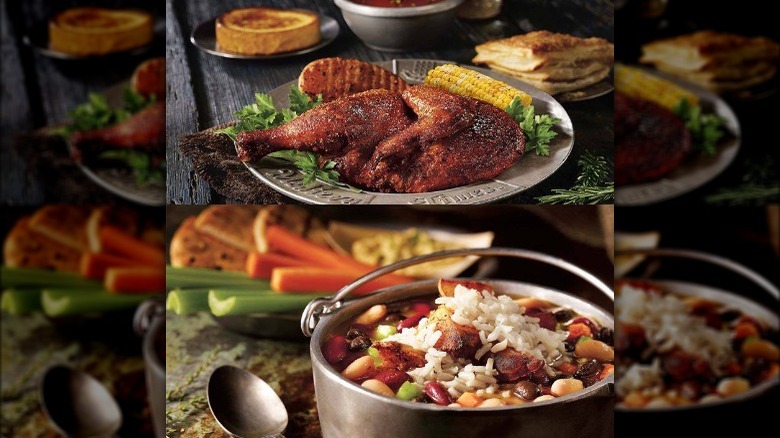Here's What Dining At Medieval Times With Dietary Restrictions Looks Like
A night at the Medieval Times Dinner and Tournament is an entrancing experience. Though living in the past is generally not recommended in day-to-day life, at Medieval Times, it's the main selling point.
Stepping into one of the multinational company's castle-like venues means stepping straight into a perfectly romanticized and exaggerated version of the Middle Ages, with kings and queens and knights jousting atop their noble steeds. It's a theatrical, immersive, magical way to spend an evening.
When it comes to the feast offerings, though, the Medieval Times menu strays a bit from the whole roasted pigs and pies that would adorn the dinner table of a royal court back in the day. Diners may be surprised to discover that each Medieval Times venue is accommodating of various dietary needs. With a respectable selection of diet and allergy-inclusive options to choose from, all Medieval Times guests can feast like royalty.
Menu offerings fit for a king
Despite its clear intentions to blast its guests into the past, Medieval Times still meets the modern demand for meals catering to certain dietary restrictions.
A quick scan of the Medieval Times website reveals the company's inclusive approach to feeding its guests. Aside from the traditional roast chicken meal, each venue offers a three-course vegan meal, featuring "a generous serving of hummus with carrot and celery sticks, a main course featuring three-bean stew with fire-roasted tomato and brown rice, and a choice of fresh fruit or Italian ice for dessert," and a vegetarian meal, which includes all the same items as the vegan meal, plus warm pita bread.
The venue also accommodates gluten-free guests with an offering of "tomato bisque soup, hummus, carrot and celery sticks, as well as the main course of roasted chicken, sweet buttered corn and herb-basted potato." For those concerned with other common allergens, such as nuts and shellfish, Medieval Times provides an allergen chart so that guests can check which dishes are safe to consume.
The dire need for inclusivity in dining
Of all the aspects of the modern world Medieval Times could adopt, a menu inclusive of dietary restrictions is smart, from a business standpoint.
In the United States, where the majority of Medieval Times establishments are located, 32 million people report to have food allergies of some sort — a number that's double what it was in the previous decade. On top of the country's collective dietary restrictions brought on by allergies, almost 10 million Americans to date identify as vegan or vegetarian. What's more, consumer trends predict that by 2040, only 40% of the global population will continue to eat conventional meat, according to A.T. Kearney.
With consumers' ever-changing dietary needs and preferences, there's no doubt that the tides of the culinary world are turning. And restaurants that don't offer inclusive menu options might be more stuck in the past than Medieval Times.


